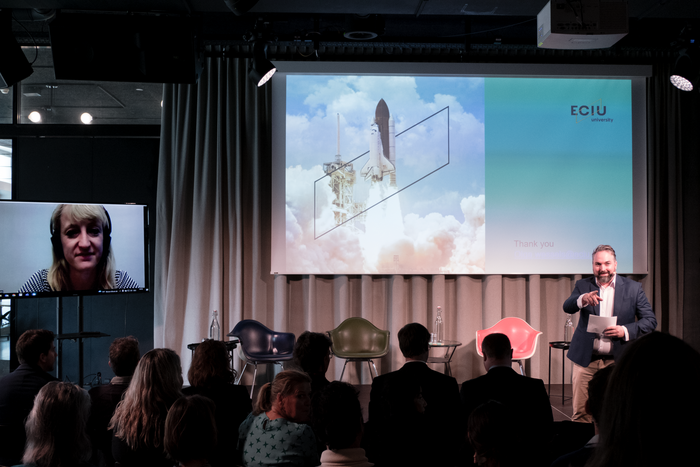There’s no innovation without internationalisation
Internationalisation as key to a diverse world ...
The event, jointly organised by Movetia, the Academic Cooperation Association (ACA) and swissuniversities, opened with a panel discussion. On the Swiss side, Martina Hirayama, Head of the State Secretariat for Education, Research and Innovation, Yves Flückiger, Rector of the University of Geneva and President of swissuniversities, and Christian Simm, Head of International Relations at the University of Zurich took part in the panel. Switzerland’s integration into European education and research networks was naturally a topic, but the discussion quickly focused on the link between internationalisation and innovation. International guests Piet van Hove, President of the EAIE, and Sijbolt Noorda, President Emeritus of the University of Amsterdam, outlined the crucial role international mobility has to play in shaping the future of our societies. Although one of the common criticisms internationalisation has to face is the risk of global uniformization, Sijbolt Noorda eloquently reminded of the fact that it is also one of the main tools available to fight this trend: “One of the central motivations for internationalisation today is to connect students to the real world, which is a world of local differences, a world of many different valleys. Erasmus is designed to do exactly that: training your mental mobility – moving from one field to another, learning from cross-overs, and having a deep understanding for the meaning of cultural differences. The future of humanity is about relearning to live with differences, and education is key to solving many of our existential threats."
... and to inclusive and bold innovation
Despite this strong vision, in practice, the implementation of internationalisation strategies is often a bumpy ride. Interactive campfire sessions, led by Marina Casal Sala, from Universitat Rovira i Virgili in Spain, Eva Haug, from the University of Applied Sciences in Amsterdam, and Piet van Hove, from the EAIE, gave the participants the opportunity to address one of three topics: “Getting staff onboard with internationalisation”, “Internationalisation at home” or “Infusing digital components in core internationalisation activities”. Discussions highlighted the need to include everyone in the process, to unite teams around a common goal, and to promote digital solutions that are as widely accessible as possible. The three sessions also reiterated a basic observation: innovation and internationalisation imply change, and change tends to raise fear and resistance. Therefore, failures along the way are completely normal!
One vision, one mission
Never the less, all speakers stressed the need to experiment and to dare try things out – or, in the words of Edwin van Rest, CEO of Studyportals: “be open to fail! ". After a presentation by Olga Wessels, Head of ECIU Brussels Office, about the importance of strategic partnerships for innovative internationalisation, Jonas Brunschwig, CEO of Swissnex India, concluded the day with a telling image: he compared the development of new international projects to "building an aeroplane while flying". Similarly, internationalisation – especially when it aims at innovation – requires courage, a certain taste for risk and an unshakeable faith in one’s mission.
Presentations
-
.pdf408 KB
-
.pdf2 MB
-
.pdf648 KB
-
.pdf401 KB
-
.pdf4 MB
Campfire Sessions Videos
-
.mp424 MB
-
.mp425 MB
-
.mp413 MB
